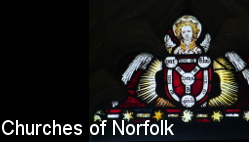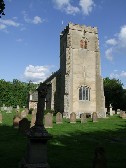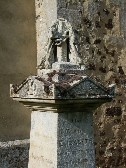| |
|
St Mary,
Crimplesham
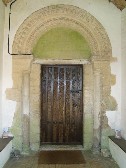 |
|
We
came to Crimplesham towards the end of a long day
which had started with heavy showers, but which
was now brightening up into a fine spring
evening, the lowering sun picking out the
gingerbread carstone speckles among St Mary's
more familiar flint. The tower appears bigger
than it is, with the big, checkerboard buttresses
standing out all the more thanks to the
rendering. At first sight, this is an
overwhelmingly late medieval building; and,
indeed, there was a major restoration in the
1870s, when the chancel was rebuilt. But stepping
into the 17th Century porch takes you back in
time almost a thousand years, because the south
door is a massive Norman structure, the tympanum
sadly lost to us. A Norman lancet hides on
the north side, but the interior of the building
is almost completely Victorian in character. Not
much here seems to have happened since the 1870s,
although the one major medieval survival, a 15th
Century roodscreen, was installed in the tower
archway in 1969. It came from a redundant church
in Essex, and looks most un-East Anglian, a
reminder of the cultural and artistic fracture
along the Stour Valley which lasted until well
into early modern times.
|
Crimplesham
comes into the benefice with Downham Market, a heartily
Anglo-catholic parish, and some of that influence is felt
here, with devotional statues and pictures. It is all
very simple, a church furnished in a seemly manner. The
only jarring note is the organ, which dominates the small
chancel, and partly cuts off the view of the sanctuary
from the nave. But otherwise, it is a peaceful and
uplifting interior, obviously well-loved and cared for.
I liked
this church a lot, and so it is with a slightly heavy
heart that I must tell you that we were treated with some
suspicion when we went for the key. I must hasten to add
that this was not so much the fault of the keyholder, who
was a charming old boy who I chatted to for quite some
time when I took the key back, but the fault of the
instructions he had been given which required him to ask
me for something that identified me as security. As I
only had my bank card with me, he took that. When I
raised concerns afterwards with the rector of this group
of parishes, especially about the possibility of the
parish making itself vulnerable to accusations of
identity theft, this policy was swiftly altered.
It is
worth saying that keyholders, and suspicious ones in
particular, are no defence against theft and vandalism.
Indeed, keyholders statistically make theft and vandalism
more common, because ordinary pilgrims and strangers will
be less likely to visit the church, and the best defence
against theft and vandalism is a well-visited church. I
doubt that single-minded thieves would be put off by
being asked for ID or deposit. I dare say they are fully
prepared for that kind of eventuality.
| Be
that as it may, we chatted for a while about the
war memorial, and in particular the two Wade
brothers who are remembered on a separate plaque.
Fred and Frank Wade were Privates in the 7th
Batallion of the Norfolk Regiment. They joined up
together at the start of the War, and were killed
within three weeks of each other in the early
winter of 1915 during the assault on Loos, in the
Pas de Calais. The Battle of Loos was the first
time that poison gas was used, incidentally by
the British on the Germans, but it seems likely
that the Wade boys were both blown to pieces,
because neither of their bodies were ever found
or identified. They are remembered
together among 20,000 names of the missing on the
Loos memorial. The plaque at Crimplesham says
that it was erected by the parishioners.
What dark days the news of October and November
1915 must have brought to this small, pretty
village.
|
|
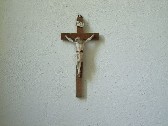 |
|
|
|
